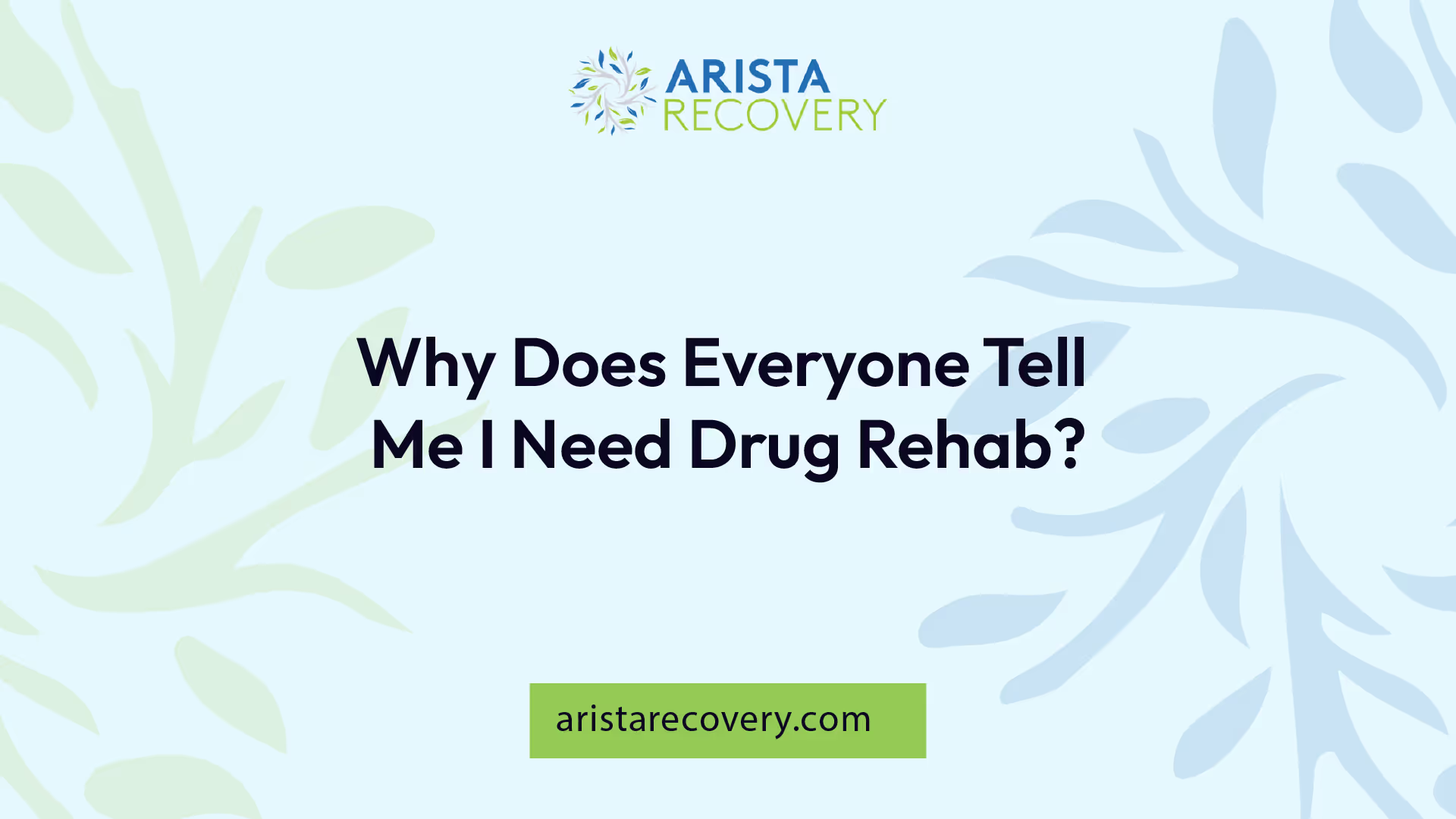Why Does Everyone Tell Me I Need Drug Rehab?


The Impact of Addiction
Addiction significantly affects an individual's life across multiple domains. It not only impacts the person struggling with substance use but also influences their relationships, work, and overall well-being. Understanding these effects can clarify why the call for drug rehabilitation is often urgent.
Effects on Various Life Areas
Addiction touches various areas of life, leading to consequences in legal, financial, social, and personal domains. The table below outlines some of the primary areas affected by addiction:
Life AreaImpact of AddictionLegalIncreased likelihood of arrests or incarceration due to illegal activities.FinancialLoss of income, increased spending on substances, and potential bankruptcy issues.FamilyStrain on family relationships, divorce, or alienation from loved ones.Work or SchoolDiminished performance, absenteeism, and potential job loss.Physical HealthIncreased susceptibility to infections, hospitalizations, and chronic diseases.Emotional HealthHeightened levels of stress, anxiety, or depression.Spiritual HealthDisconnection from personal beliefs and feelings of worthlessness.Hobbies and InterestsLoss of interest in activities previously enjoyed.
Evaluating these areas helps individuals recognize the profound impacts of addiction on their lives and the lives of those around them [1].
Health Implications
The health implications of addiction are extensive and often severe. Substance abuse can lead to various health complications, including:
These health risks extend beyond the individual with addiction, affecting close family and friends, and creating a broader public health concern. Understanding these impacts underlines the urgency of seeking drug rehab and professional help.
Co-Occurrence of Addiction and Mental Health
Understanding the connection between addiction and mental health is essential for addressing both issues effectively. Individuals often face overlapping challenges that impact their recovery journey.
Relationship between Drug Use and Mental Health
Drug addiction and mental disorders frequently co-exist. Instances of anxiety, depression, or schizophrenia may precede addiction. In some cases, individuals may turn to drugs to alleviate psychiatric symptoms, thereby worsening their mental conditions and increasing the risk of developing addiction.
The following table outlines common mental health disorders that can co-occur with substance use disorders (SUD):
Mental Health DisorderDescriptionAnxiety DisordersInclude various forms of anxiety and panic attacks.DepressionPersistent feelings of sadness and hopelessness.ADHDAttention Deficit Hyperactivity Disorder, affecting focus and impulse control.Bipolar DisorderMood swings ranging from depressive lows to manic highs.Personality DisordersConditions that affect how one thinks and interacts with others.SchizophreniaA serious mental disorder that affects how a person thinks, feels, and behaves.
Research indicates that having both SUDs and mental disorders does not necessarily imply causation. There are multiple factors contributing to this co-occurrence.
Addressing Co-Occurring Disorders
Effective treatment for individuals grappling with both substance use and mental health disorders requires tailored behavioral therapies. These therapies need to be customized according to the unique combination of disorders and symptoms that the individual experiences. Important considerations for treatment include:
The term "co-occurring disorder" or "dual diagnosis" denotes the link between substance abuse and mental health issues. According to the Journal of the American Medical Association, the prevalence of co-occurring substance abuse and mental health disorders is more common than many people realize.
By recognizing and addressing the interactions between mental health and addiction, individuals can pursue a more effective path to recovery.
Importance of Seeking Help
Seeking help for addiction is a critical step toward recovery. Understanding the advantages of rehab facilities and the structured approach they provide can clarify why it's often suggested that someone attend drug rehabilitation.
Benefits of Rehab Facilities
Rehab facilities are specifically designed to provide individuals struggling with substance abuse the tools and resources necessary to overcome their addiction. Here are some key benefits:
BenefitDescriptionSafe EnvironmentInpatient or outpatient programs offer a supportive setting essential for maintaining long-term sobriety.Professional SupportAccess to trained professionals who can guide individuals through their recovery journey.Therapeutic OptionsVarious therapies help to understand emotional triggers and develop healthy coping mechanisms, crucial for reducing the chances of relapse [5].Health and Nutrition FocusRehab facilities often provide balanced meals and encourage physical activity, which aid in recovery and help to rebuild healthy habits [5].
Attending addiction treatment helps individuals learn how to build a productive, healthy, and happy life.
Structured Approach to Recovery
The structure provided by rehab facilities is vital in replacing self-destructive habits with positive ones. This structure helps make sobriety a priority while promoting a balanced lifestyle post-treatment.
Key aspects of the structured approach include:
AspectDescriptionRoutineA daily schedule helps instill discipline, reducing the likelihood of reverting to previous destructive behaviors.Peer SupportInteraction with others in similar situations provides a sense of community and shared understanding, crucial for overcoming addiction.Skill DevelopmentPrograms often include workshops and activities designed to teach important life skills that support recovery.
By addressing both the psychological and emotional aspects of addiction, rehab facilitates a comprehensive approach to recovery that is essential for long-term success.
Holistic Approaches to Recovery
Holistic approaches to recovery recognize that addiction impacts not just the individual but various aspects of their life. By incorporating therapeutic tools and focusing on health and nutrition, rehab facilities aim to support a well-rounded recovery process.
Therapeutic Tools in Rehabilitation
Rehabilitation programs offer a variety of therapeutic tools essential for understanding emotional triggers and developing healthy coping mechanisms. These therapies play a crucial role in reducing the chances of relapse and maintaining sobriety. Inpatient or outpatient rehab programs provide a safe and supportive environment, where peer support can significantly aid individuals in overcoming addiction.
Type of TherapyDescriptionCognitive Behavioral Therapy (CBT)Helps individuals identify harmful thought patterns and develop healthier responses.Group TherapyProvides a supportive setting for sharing experiences and building peer connections.Individual CounselingOffers personalized guidance and support tailored to specific needs.Art / Music TherapyUses creative expression to communicate feelings and promote emotional healing.
The structure provided by a rehab facility is essential in replacing self-destructive habits with positive ones. This structured approach makes sobriety a priority while helping individuals maintain a balanced lifestyle post-treatment.
Focusing on Health and Nutrition
Health and nutrition play a vital role in the recovery journey. Many rehab facilities emphasize balanced meals and physical activities, such as exercise, to aid in proper recovery. These practices help rebuild healthy habits, reduce drug cravings, and prevent relapse.
Nutritional ElementBenefitProteinSupports muscle repair and overall health; offers lasting energy.Complex CarbohydratesProvide energy and improve mood by stabilizing blood sugar levels.Healthy FatsSupport brain health and reduce inflammation.Vitamins and MineralsAid in recovery and support immune function.
By focusing on a holistic approach that includes therapeutic tools and nutritional considerations, individuals can achieve a more comprehensive recovery, addressing the various facets of addiction. This combination of strategies helps individuals lead productive, healthy lives while prioritizing sobriety.
Family Dynamics in Addiction
Impact on Family Members
Addiction affects not only the individual but also their family members. Families often develop coping strategies such as hiding the addiction, avoiding conversations about it, providing financial support, or taking over neglected responsibilities. While these methods may help the family function on some level, they often perpetuate the addiction cycle. Family members might also resort to substance use or gambling themselves to cope with the stress, leading to conflict and adverse health impacts [6].
Children in families impacted by addiction face unique challenges. They may experience an unstable home environment, inconsistent parenting, and a lack of basic necessities. This instability can lead to feelings of insecurity and abandonment, as well as the inappropriate assumption of adult roles. Research indicates that these children are at a higher risk of engaging in anti-social behaviors, school truancy, or developing unhealthy habits, such as eating disorders.
In cases where a parent struggles with a substance use disorder, the consequences can be severe. They are three times more likely to physically or sexually abuse their children, leading to a greater likelihood of juvenile arrests and violent crime amongst these children. Substance abuse can disrupt familial bonds, potentially resulting in foster care placements and long-lasting emotional and psychological issues for children [7].
Involving Families in Treatment
Involving families in the recovery process is crucial for effective treatment and long-lasting recovery. Support groups, counselors, or religious leaders can offer guidance and understanding to family members affected by a loved one’s addiction. External support systems equip families with strategies to manage their challenges and foster an environment conducive to healing.
Family therapy can play a vital role in the treatment process. This approach not only addresses the needs of the individual battling addiction but also helps family members understand their roles within the family dynamic. By improving communication and rebuilding trust, families can create a supportive environment that encourages the recovery of their loved one.
By working together and recognizing the impact of addiction, families can be stronger allies in the recovery journey. Leveraging support networks and professional resources facilitates a healthier family structure, promoting resilience and hope for all involved.
Social Work in Addressing Addiction
Social workers play a critical role in helping individuals and families address the challenges associated with addiction. Their responsibilities extend beyond the individual experiencing substance use disorders and focus on the broader impact on family dynamics and community well-being.
Social Workers' Roles and Responsibilities
Social workers understand the significance of involving family members in the treatment process for substance use disorders (SUDs). Research indicates that family involvement can enhance the effectiveness of treatment, making it more beneficial than addressing the individual in isolation [7].
Their responsibilities typically include:
RoleDescriptionAssessmentEvaluating individuals and families to identify specific needs related to addiction and recovery.AdvocacySupporting individuals in accessing necessary resources, including rehab programs and health services.CounselingProviding therapy and support to individuals and families affected by addiction.CoordinationCollaborating with healthcare providers, community organizations, and family members to create a cohesive care plan.EducationInforming families about addiction, recovery processes, and available support systems.
Supporting Families Affected by Substance Abuse
Addiction impacts not only the individual but also their families, often leading to unhealthy coping mechanisms. Family members may adopt various strategies to deal with a loved one’s addiction, such as hiding the problem, avoiding communication, or providing financial support.
Families face several challenges, including:
ChallengeDescriptionCommunication BreakdownFamily members might struggle to discuss the addiction openly, leading to feelings of isolation.Emotional DistressFamily dynamics can be strained, resulting in anxiety, depression, and other emotional issues.Neglected ResponsibilitiesFamily members may inadvertently take on additional responsibilities, leading to burnout.
Children living with parents who have SUDs face increased risks of developing internalized problems, such as anxiety, depression, and behavioral issues. Parents with addiction issues may provide unsuitable environments for their children, affecting their emotional development and potentially resulting in adverse behaviors.
Support groups, counselors, or community leaders can significantly help families cope with these challenges. They not only provide emotional support but also educate families on how to address addiction and its effects. Furthermore, children of parents with SUDs are three times more likely to experience physical or sexual abuse [7]. This underscores the need for comprehensive support systems that engage both individuals in recovery and their family members to foster healthier environments and promote recovery.
References
[2]:
[3]:
[4]:
[5]:
[6]:
[7]:
You’re not alone in this.
When mental health challenges and addiction intersect, it can feel isolating. At Arista, we offer compassionate, evidence-based, and trauma-informed care to help you heal, grow, and move forward.
You’re not alone in this.
When mental health challenges and addiction intersect, it can feel isolating. At Arista, we offer compassionate, evidence-based, and trauma-informed care to help you heal, grow, and move forward.
Support that moves with you.
You’ve taken a brave first step. At Arista Recovery, we’re here to help you continue with best-in-class care designed for long-term healing and support.
.webp)






